The Development and Relief project (DRP) seeks to reduce poverty among the Parkari community by promoting health awareness, use of appropriate technology, skills training, and income generation activities throughout the community.
The core activities of the DRP are as follows:
Hand Pumps
Access to clean water
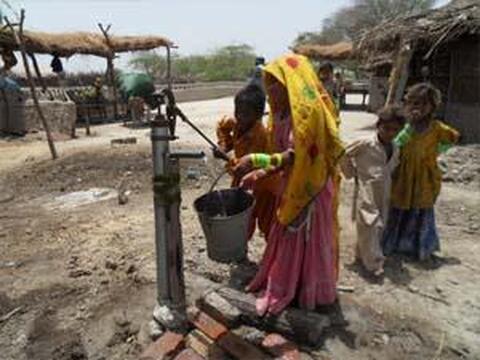
The community in the Barrage area f aces the problem of unclean drinking water. The canal water is not safe to drink (stomach ache and other diseases are common among the community). This scheme provides hand pumps to villages to address the problem of water borne diseases.
Small Wells and Underground Water Storage Tanks
Saving water for long term use
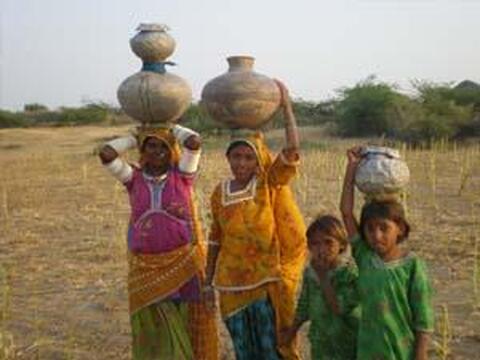
Drinking water is the main problem for people and livestock in the desert area. Women travel a long distance to fetch the drinking water from the deep wells. The construction of small wells and underground water storage tanks helps the community to save water during the rain.
Sewing Skills
Income generation through tailoring skills
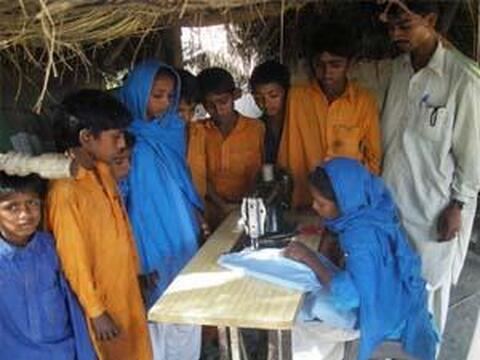
The sewing skills training focuses on men and women, enabling them to learn tailoring skills and the use of treadle-operated sewing machines. This scheme also operates on a-sharing basis. PCDP provides each Sewing Centre with sewing machines, cloth and thread. A trained master tailor is also provided to teach tailoring skills and how to use a sewing machine. After the completion of this sewing skill training, the men and women are then able to make clothes for their own families and can earn their livelihood as tailors. This helps to reduce poverty and increases self-reliance.
Veterinary Skills
Income generation through veterinary skills

This activity provides an opportunity to the Parkari people to be trained in Veterinary skills, in order to provide animal health care services to the villagers on their doorstep, as well as imparting awareness about animal diseases and caring for their livestock.
Handicraft Skills
Income generation through handicrafts
The handicraft scheme is designed to empower rural and desert women to generate income for their families through producing embroidery, quilts, cards, necklaces and other items using traditional skills. A female handicraft trainer teaches essential aspects of design, quality control, pricing and market awareness, and assists in developing appropriate marketing outlets
Relief Programmes
Provision of emergency relief
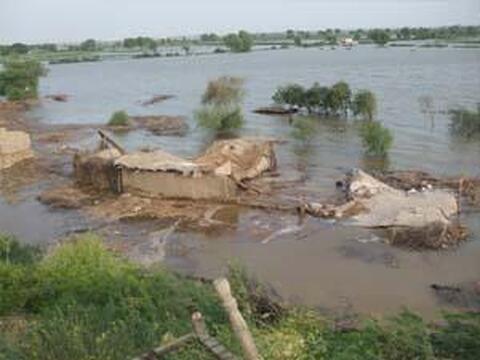
PCDP believes in actively supporting the community by building capacity and promoting self-reliance. However, when natural disasters happen and provision of aid becomes necessary for the survival of vulnerable communities. Then, in targeted areas, PCDP strives to provide emergency relief whenever possible. In 2002 there was severe famine in the desert area as a result of two years of continuous drought, and DRP staff were able to provide emergency relief for more than 1200 families. In 2003, the Badin district suffered from extensive flooding and DRP staff helped 450 families by providing food packages. DRP’s relief programme complements its development schemes by continuing to address the needs of the community even in
disaster situations. In 2010 and 2011, extensive monsoon-related flooding devastated the Sindh area of Pakistan. About a million people were affected, and tens of thousands lost their homes. Thousands of displaced people were affected by malaria, skin conditions and abdominal diseases in the flood-hit areas. Gastroenteritis and malaria killed many
of the infected people, especially

children. PCDP’s DRP project was able to give assistance to Parkaris in desperate need, and took no notice of political or religious affiliations. In October 2010 during Relief phase 1, the PCDP Relief Committee distributed food items to 1108 families (6204 individuals) in 77 flood affected villages in the Barrage area. In the second phase there was an urgent need for materials to provide shelter from the elements. Consequently, in June 2011 appropriate materials were distributed to 235 families (1321 individuals) in various districts near Thatta, in the Sindh province of Pakistan. In phase 3 on September 23rd 2011 PCDP provided cash assistance to 391 families in 23 villages in Badin district in Sindh. Each family received Rs. 500. Priority was given to the most disadvantaged people. In the fourth phase in October 2011,
PCDP distributed 330 relief packages containing food and non-food items to children from the Parkari multi-lingual schools, i.e. 1330
flood affected families (1980 individuals) in the Barrage area, also in Sindh. Phase 5: Also in October 2011, the PCDP Relief
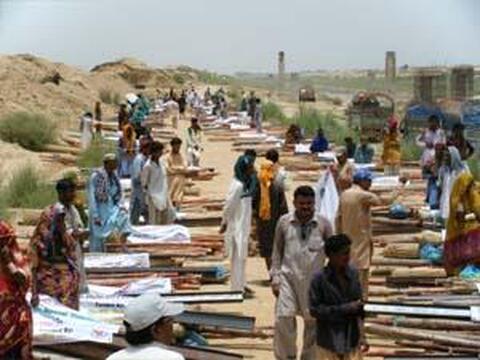
Committee set up 6 Parkari Organizational Units in the Desert and Barrage areas of Sindh province. They also distributed relief packages of food and non-food items to 1700 flood affected families in Mirpurkhas district, Tando Allahyar and Badin, all in Sindh. Phase 6: PCDP distributed packages containing basic food items as well as other household necessities to Parkari widows in the desert area.